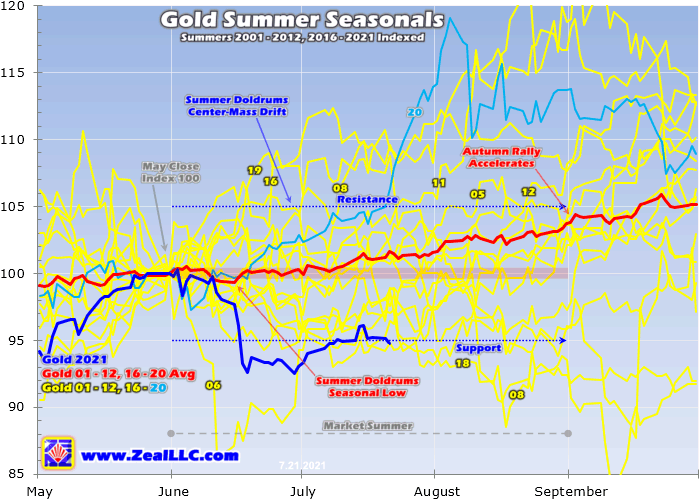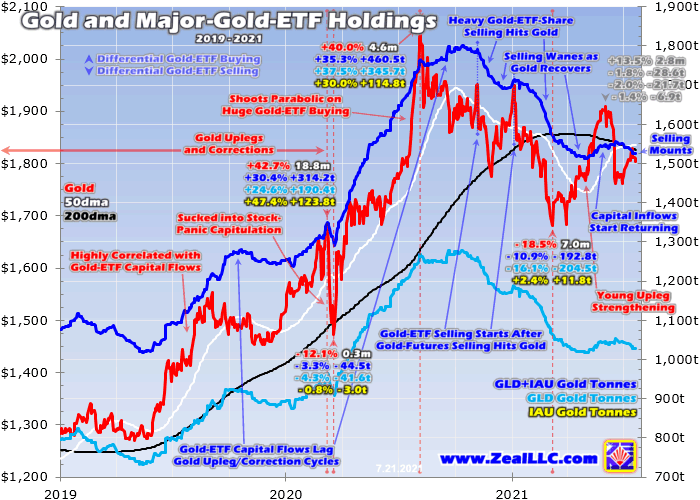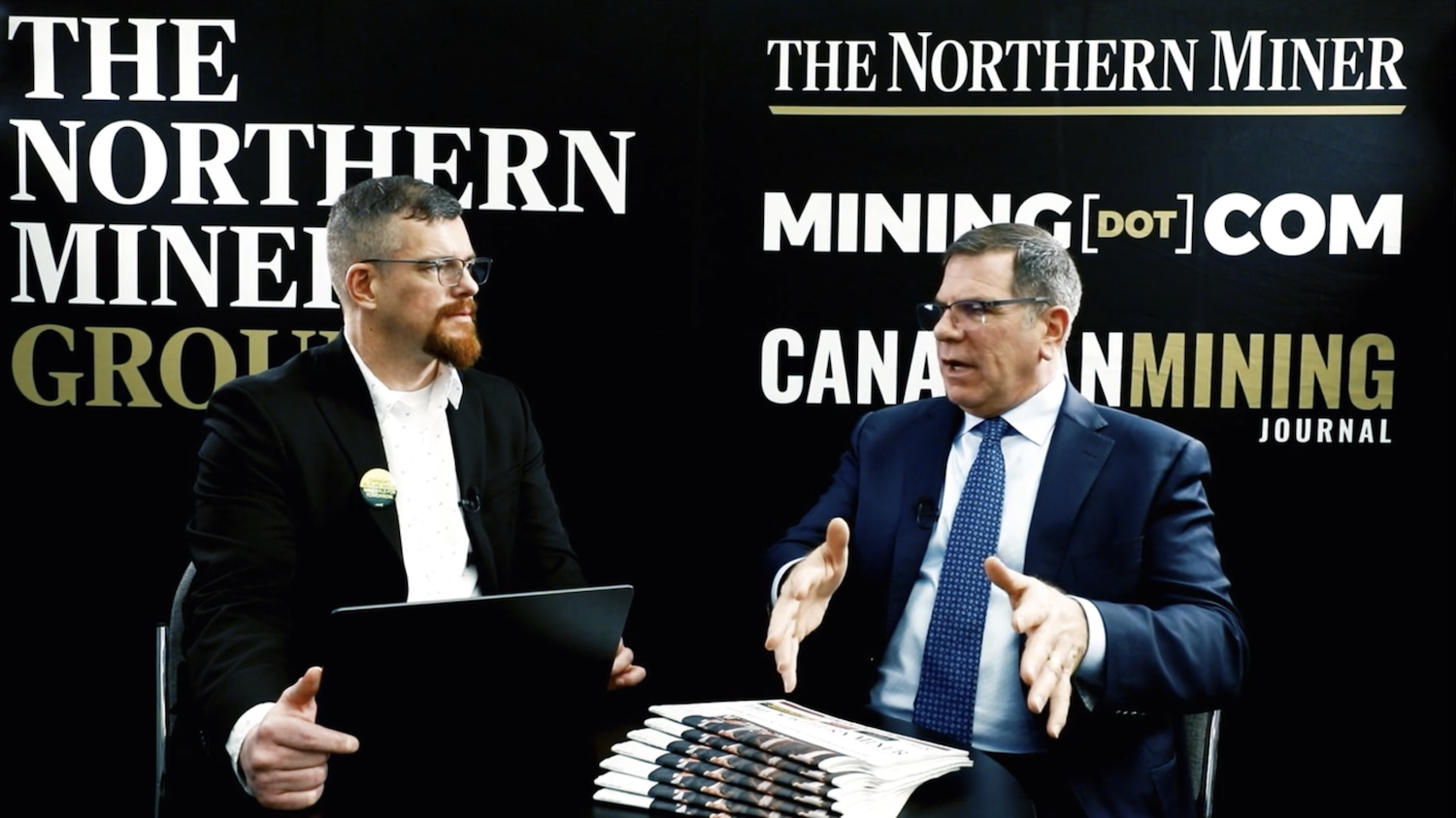Gold investors wavering

Gold has been sucking wind this summer, trudging along after getting slammed by a distant-future-rate-hikes scare. The resulting lower prices have really damaged psychology, leaving investors wavering on gold. Their recent capital inflows have reversed into modest selling, contributing to unusual weakness in this leading alternative asset. But investment demand should roar back in this inflationary environment.
Gold entered summer 2021 with strong upside momentum, in a young upleg that had just powered up 13.5% in 2.8 months by early June. This current interrupted upleg is the fifth of gold’s secular bull, and the previous four averaged big 33.3% gains. Gold was progressing nicely until the June 16th meeting of the Fed’s Federal Open Market Committee. The FOMC was expected to do nothing, and that’s what it did.
In a nothingburger monetary-policy decision, the FOMC left its zero-interest-rate policy and $120b per month of quantitative-easing money printing in place indefinitely. There were no hints that either of these hyper-easy policy stances would be changed anytime soon. The leveraged gold-futures speculators who dominate gold’s short-term fortunes should’ve yawned at that, and gone back to enjoying lazy summers.
But with every other FOMC decision, the Fed releases a Summary of Economic Projections that shows where individual top Fed officials expect to see certain economic data in coming years. That includes their outlooks for the federal-funds rate, which are gathered in a scatter chart known as the “dot plot”. In mid-June’s version, 6 out of 18 top Fed officials thought there might be two quarter-point hikes into year-end 2023!
That was about 2.5 years into the future, an eternity away in the markets. And the dot plot has proven a notoriously-inaccurate FFR predictor anyway. That very afternoon the Fed chair himself warned that the dots are “not a Committee forecast, they’re not a plan. … the dots are not a great forecaster of future rate moves.” He said they should “be taken with a big grain of salt.” Jerome Powell advised to ignore the dot plot!
That is wise given dots’ dismal track record, as they’ve often proven dead-wrong. Back in December 2015 after the first rate hike of the last cycle, top Fed officials expected four more rate hikes in 2016. But only a single one happened, a year later in December! In December 2018 with the ninth hike of that cycle, the dots predicted three more hikes in 2019 and 2020. Zero of those actually came to pass, that hiking was done.
Yet in mid-June 2021, futures traders active in US-dollar and gold contracts acted as if those distant-future hawkish dots were an official FOMC decree heralding a new hiking cycle. So they bid up the US dollar sharply on prospects for higher rates, which unleashed withering gold-futures selling. In three trading days starting with the FOMC, the US Dollar Index blasted 1.9% higher hammering gold a brutal 5.2% lower!
I wrote about that Fed-gold-futures purge extensively that very week, analyzing how specs’ positioning leading into it meant their selling firepower would quickly exhaust itself. That indeed proved true, as gold bottomed after that kneejerk several-day pummeling. But that anomalous plunge left serious sentiment damage in its wake. Bearishness flared overpowering bullishness, leaving traders discouraged on gold.
This indexed gold-summer-seasonals chart is updated from my latest essay on that research thread of a few weeks ago. It renders all modern-gold-bull-year summers in like terms by indexing gold’s price action to May’s final close. Note that mid-June’s ridiculous gold plunge on unofficial rate-hike projections way out into the distant future made for one of gold’s weakest summers ever. That has left investors wavering.

Out of 18 gold-bull years between 2001 to 2012 and 2016 to 2021, gold has only suffered a worse June once. That was way back in 2006, in a radically-different situation that justified a sharp correction. Gold had just rocketed 46.2% higher in only 4.6 months into mid-May, leaving it incredibly overbought! So a big-and-fast correction was necessary to rebalance sentiment. That sure wasn’t the case this summer.
Gold has recovered some since that hawkish-Fed-dots pummeling, but remains way down summer-to-date. By mid-July, gold had rallied 3.8% regaining about two-thirds of its post-FOMC losses. But gold had also fallen considerably in the few days leading into that FOMC meeting, as traders worried the Fed might warn it was starting to think about tapering its QE bond monetizations. That didn’t happen though.
Gold entered June at young-upleg highs near $1,903, retreated to $1,859 on the eve of that FOMC day, plummeted to $1,763 a few trading days later, then rebounded to $1,829 a couple weeks ago. That wild mostly-downside ride has left investors wary of the yellow metal. They like to chase upside momentum, which has been sorely lacking in gold this summer. Thus investment capital flows have reversed to selling.
Comprehensive global gold supply-and-demand data is only published once a quarter by the World Gold Council, in their fantastic Gold Demand Trends reports. But a great high-resolution daily proxy for world gold investment is the physical-gold-bullion holdings of the leading and dominant gold exchange-traded funds. These are of course the massive American GLD SPDR Gold Shares and IAU iShares Gold Trust.
In the WGC’s latest GDT covering Q1’21, GLD and IAU commanded 29.0% and 14.1% of all the gold held by all the world’s physically-backed gold ETFs! The distant third was a UK competitor at just 6.3%. Global gold ETFs suffered major draws in Q1 as investors fled a gold correction. GLD+IAU holdings alone accounted for nearly 7/8ths of that world total. These huge ETFs increasingly dominate gold investment.
This next chart superimposes GLD+IAU holdings over gold itself, revealing how they moved during major uplegs and corrections in the yellow metal. For our purposes today, we are zooming in to the action this summer. Investment capital was flowing into gold before that hawkish-Fed-dots scare, stalled in its wake, then rolled over into modest selling since gold’s recovery has been anemic. That has weighed on prices.

Gold’s anomalous post-FOMC plunge is readily apparent even at this multi-year scale, and the trajectory of GLD+IAU holdings and thus investment capital flows have turned south since. Heading into June, the combined GLD+IAU holdings were running 1,543.8 metric tons. Despite gold’s slump ahead of that FOMC meeting on unfounded QE-tapering fears, GLD+IAU holdings edged up 0.2% to 1,547.6t on that Fed eve.
Then initially as gold plummeted 5.2% in those three trading days starting with those hawkish dots, that didn’t seem to faze investors. The capital inflows into gold via differential gold-ETF-share buying not only persisted, but accelerated. GLD+IAU holdings climbed 0.6% to 1,556.8t during that gold-plunging span! But after gold failed to recover fast in a sharp V-bounce, investors’ confidence in its near-term outlook waned.
Gold investment-capital outflows were small in the last couple weeks of June, with GLD+IAU holdings slipping 0.4% by month-end from their post-FOMC high. But unfortunately that differential gold-ETF-share selling has intensified since. By mid-July, GLD+IAU holdings had fallen another 1.6% month-to-date to 1,525.2t. Overall between soon after the FOMC to last Friday, those draws totaled 2.0% or 31.5t.
Fortunately this mounting selling remains modest if not smallish. For some perspective, in just the single Commitments-of-Traders week straddling that mid-June FOMC meeting speculators dumped the gold-futures equivalent of 89.7t! That is what blasted gold 5.2% lower in three trading days despite that concurrent build in GLD+IAU holdings. So this mid-summer gold investment selling hasn’t been a threat yet.
And it shouldn’t become one, as gold has been holding its own since that ridiculous distant-future-rate-hikes scare and clawing its way back higher on balance. But this festering investment selling is certainly reinforcing gold’s slow recovery. Again investors live to chase upside momentum, and gold has mostly been lacking in that department because of those hawkish Fed dots. So investors have been wavering since.
While their sentiment is damaged, it definitely isn’t bearish since their recent selling has proven limited. Thus it shouldn’t take much of a gold advance to start enticing investors back in. And their capital inflows resuming will accelerate gold’s gains, attracting in more investors forming the powerful virtuous circle of buying typical in major gold uplegs. Higher gold prices bring people back, and their buying pushes gold higher.
One reason gold investment is likely to improve soon is August sees strong autumn-rally seasonals. I’m updating that research thread for a new essay next week, but for now realize August has proven gold’s second-strongest month through those same modern bull years in the first chart above. On average gold has surged 2.1% higher in August, followed by another big 1.7% in September! That stretch is super-bullish.
A far-better argument for upping portfolio allocations to gold is the raging inflation this profligate Fed has unleashed. Between March 2020’s pandemic-lockdown stock panic to mid-July, the US Federal Reserve has ballooned its balance sheet a terrifying 90.2% or $3,890b! That’s no typo, in just 16.1 months the Fed has nearly doubled the US-dollar supply! And $120b of monthly QE is continuing that extreme growth.
This radically-unprecedented deluge of new money conjured out of thin air to monetize the US federal government’s insanely-huge deficits is naturally forcing prices sharply higher. Relatively-more money bidding up the prices on relatively-less goods and services is the very definition of inflation. And as that becomes ever-more apparent in investors’ everyday lives, they will flock back to the ultimate inflation hedge.
The latest official inflation reads from the US government are red-hot, even though they are intentionally lowballed statistically. Last week the US Consumer Price Index was reported as soaring 0.9% month-on-month and 5.4% year-over-year in June! And the core read stripping out food and energy looked even worse, rocketing up 4.5% YoY! That proved the hottest core inflation since way back in September 1991!
We are all seeing much-higher and ever-rising prices in most of the things we need and want to buy, this price inflation is real. What did the Fed expect nearly doubling the US money supply in just a year-and-a-third? And as everyone responsible for running a household or business is painfully aware, the true inflation rate is far hotter than the 5%ish the US federal government is claiming. It is definitely double-digits.
I could write essays on how official reporting lowballs inflation, but consider an example. In the blistering inflation year of 1979 when gold skyrocketed, the CPI rose 11.3%. That was partially driven by a 14% increase in house prices, a critical component of living. Today’s watered-down CPI no longer includes house prices, which are soaring. Instead a garbage arbitrary construct called owners-equivalent rent is substituted.
That makes up about a quarter of the CPI, and is only up 2.3% in the past year according to government statisticians. A 2.3% increase in housing costs is ludicrous compared to the real-world. Just yesterday for example, a separate dataset revealed the US median house price soared 23.4% YoY to an all-time high of $363k! Americans’ actual housing costs are rising an order of magnitude faster than the CPI is reporting.
Throw out that OER fairy-tale and replace it with hard actual house-price data, and the CPI would already be blasting higher in double-digits right now! And that doesn’t include all kinds of other hedonic statistical wizardry intentionally included to underreport inflation. Higher inflation fuels political and social unrest, and raises the financial burden on the government to increase welfare payments. Politicians fear high inflation.
And this soaring price inflation isn’t going away unless the Fed starts unwinding its reckless mushrooming of the money supply. Consumer prices are fed by producer prices, wholesale inflation at factory gates. Of course that is still blasting higher too with that flood of new dollars bidding up prices. The latest June read for the US PPI showed a scary 7.3% YoY gain, the hottest on record in the current iteration of this data!
That baked-in pipeline inflation will continue to translate into higher consumer prices. Whenever I get a chance to talk with anyone, I try to work inflation into the conversation. I ask them what they are seeing in terms of prices and the costs of living for their households. Americans are increasingly aware that prices are relentlessly spiraling higher, and eventually the rightful blame for this crisis will be laid at the Fed’s feet.
How did gold fare in 1979 the last time excessive monetary growth unleashed serious inflation? During that calendar year alone it skyrocketed 126.5% higher! As investors start understanding the dangerous inflationary monster the Fed has foolishly spawned, and realize it can’t be killed without shrinking the money supply which would trigger a depression and crash the stock markets, gold investment demand will soar.
These lofty Fed-levitated stock markets are another reason gold portfolio allocations need to shoot way higher. That 90%+ explosion in the Fed’s balance sheet is the primary reason why the benchmark S&P 500 US stock index soared 96.0% at best since March 2020’s panic. That has driven stocks deep into bubble territory, with SPX companies averaging trailing-twelve-month price-to-earnings ratios of 36.5x entering July!
Historical fair-value over the past century-and-a-half or so is 14x earnings, and double that at 28x is the starting threshold for bubbles. That makes US stocks extraordinarily vulnerable to a new bear market. Though the Fed’s QE has delayed that, the last couple bears ending in October 2002 and March 2009 mauled the S&P 500 down 49.1% over 2.6 years and 56.8% over 1.4 years! The next bear is long overdue.
It could awaken when the Fed starts tapering QE, slowing its $120b per month of bond monetizations. And it would almost certainly roar if the Fed reverses quantitative easing to quantitative tightening, actually selling bonds to unwind some of the trillions of new dollars it has created. Whatever the bear-igniting spark, weaker stock markets will really boost demand for the leading alternative investment which is gold.
During bears it generally moves counter to stock markets, rallying on capital inflows as investors wisely diversify from overweight stock positions. And the room for portfolio-shifting gold buying is enormous. One proxy for gold investment compares the value of GLD+IAU holdings to all S&P 500 stocks’ market caps. Exiting June, that ratio ran a trivial 0.2%! American stock investors had only 0.2% allocated to gold.
For centuries if not millennia, 5% to 10% was considered the minimum prudent portfolio allocation in gold. Given this crazy-inflationary backdrop today, 20% is probably far smarter. At any rate, vast amounts of capital should flow into gold as central banks continue to balloon money supplies forcing all prices higher. If American stock investors even move from 0.2% to 1% or 2%, gold prices would power higher for years.
As the Fed can’t stuff this inflationary genie back in the bottle without slashing the money supply back to pre-pandemic levels, which would again crash the stock markets and spawn a depression, the arguments for gold investment are stronger than ever. Investors will increasingly return bidding up the yellow metal’s price as their inflation worries mount. And these spiraling-higher prices will continue growing into a bigger issue.
The main beneficiary of gold rebounding and resuming its FOMC-interrupted upleg will be gold miners’ stocks. That silly hawkish-Fed-dots scare hammered their prices down to really-oversold levels relative to their 200-day moving averages and really-undervalued levels compared to gold. As usual gold stocks will amplify gold’s coming upside, with the best gains accruing in fundamentally-superior mid-tiers and juniors.
The bottom line is gold investors are wavering, their psychology damaged after gold plummeted in mid-June on those hawkish Fed dots. Without enough upside momentum to chase, investors have been selling gold on balance since soon after the FOMC. While modest, those investment capital outflows have still weighed on gold’s price. But investors’ light selling should quickly reverse to sizable buying as gold perks up.
Strong seasonals resume in August, a very-bullish omen. And the spiraling price inflation unleashed by the Fed’s colossal balance-sheet ballooning is increasingly becoming center-stage. The more investors grow aware of how serious this late-1970s-like inflation is, the more capital they will move into gold. It has always been the ultimate inflation hedge, and higher prices beget more buying fueling a virtuous circle of upside.
(By Adam Hamilton)
More News
{{ commodity.name }}
{{ post.title }}
{{ post.date }}




Comments